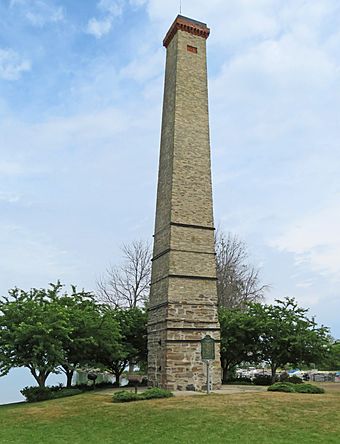W. R. Stafford Saw Mill Site facts for kids
Quick facts for kids |
|
|
W.R Stafford Saw Mill Site
|
|

Site in 2018
|
|
| Location | 4451 Huron St., Port Hope, Michigan |
|---|---|
| Area | 4.5 acres (1.8 ha) |
| Built | 1858 |
| Built by | John Geltz |
| MPS | Port Hope MPS |
| NRHP reference No. | 87001959 |
| Added to NRHP | November 20, 1987 |
The W.R Stafford Saw Mill Site is a special place in Port Hope, Michigan. It holds the old remains of a saw mill from the mid-1800s. A saw mill is a factory that cuts logs into lumber. This site is located at 4451 Huron Street, right by the beautiful Lake Huron.
Today, the only part of the old mill you can still see is its tall chimney. This chimney is often called the Port Hope Chimney. The area around it is now part of the Stafford County Park. Because of its history, the site was added to the National Register of Historic Places in 1987. This means it's a very important historical spot!
History of the Saw Mill
The very first saw mill at this spot was built in 1858. It was made for a lumberman named William R. Stafford. A skilled builder named John Geitz constructed the mill's strong stone chimney.
Sadly, the original mill, its docks, and many workers' homes were all destroyed by a big fire in 1871. But people didn't give up! The mill was rebuilt in 1872. However, another fire struck in 1881, destroying it a second time. The mill was rebuilt again after that. It kept working until the early 1890s. The amazing 1858 chimney was strong enough to be used by all three mills!
After the last mill stopped working, the buildings sat empty for many years. A big storm in 1913 destroyed the long dock that reached into the lake. The very last building from the mill was taken down in 1941. A local farmer moved it and used it as a shed on his farm.
What the Site Looks Like Today
The old saw mill site is now a fun county park. It has parking areas, green lawns, and a nice beach. The park covers where the 1858 saw mill once stood. It also includes the land around it. Under the water or covered by sand are the remains of the old Stafford dock. This dock used to stretch 1,000 feet into Lake Huron! It was built from timber boxes filled with heavy stones.
The most famous part of the site is still the 1858 chimney. It stands tall right near the beach. The bottom part of the chimney is about nine by ten feet wide. It rises about 80 feet into the sky. The first 20 feet are made of strong sandstone. This section has an open fireplace on one side. The top 60 feet are built from red bricks. This part gets a little narrower as it goes higher.



